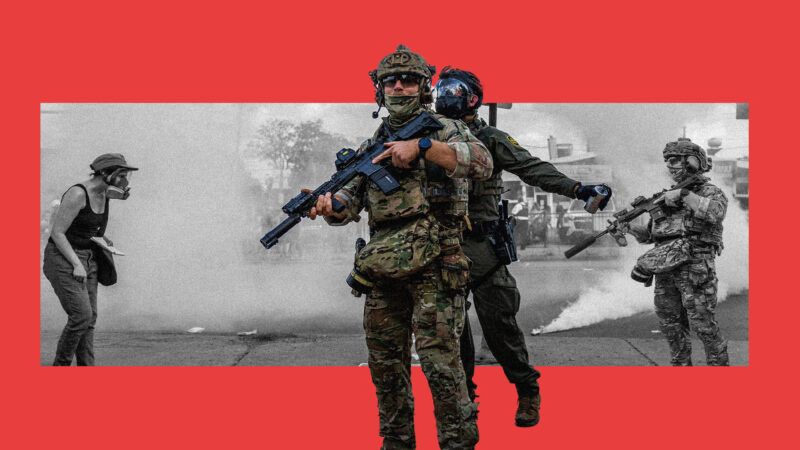Federal Agents Can Continue To Use Riot Control Weapons in Chicago With Limited Oversight Amid Pending Appeal
The ruling comes as federal immigration agents leave Chicago for operations in Charlotte, North Carolina, and New Orleans.

A federal judge's order designed to protect the constitutional rights of nonthreatening protestors and the press in the Chicago area was paused on Wednesday after the 7th Circuit Court of Appeals granted an emergency stay. Although federal immigration authorities have wound down operations in the Windy City for now, the decision means that the court will have less oversight over any agents who remain and use riot control weapons on opponents of President Donald Trump's mass deportation campaign.
United States District Judge Sara L. Ellis issued a preliminary injunction on November 6 after the Trump administration and federal agents were sued for engaging in "extreme brutality" to "silence the press and civilians" protesting "Operation Midway Blitz," the ongoing immigration operation in Chicago. After hearing evidence of agents deploying riot control weapons and chemical irritants against protestors and bystanders without warning, Ellis stated in court that the evidence so far "shocks the conscience," and that the Justice Department's arguments to defend against the accusations "lack credibility," according to the Chicago Sun-Times. Ellis also highlighted an incident in which Gregory Bovino, the Border Patrol chief leading immigration operations in Chicago until recently, was captured on video throwing a tear gas canister into a crowd. Bovino later admitted to lying about a rock hitting him in the head before deploying the tear gas.
Ellis' order required agents to have "visible identification" and activated body cameras, and forbade them from using "riot control weapons," including chemical irritants and rubber bullets, and "hands-on physical force," like tackling or using choke holds and neck restraints, "unless such force is objectively reasonable to stop an immediate threat." But the Justice Department quickly appealed Ellis' decision on November 10, arguing that her "overbroad and unworkable injunction has no basis in law, threatens the safety of federal officers, and violates the separation of powers."
On Wednesday, the 7th Circuit's three-judge panel granted the Justice Department's request for an emergency stay, ruling that Ellis' order was "too prescriptive" and "resembles federal regulation." "The practical effect [of the preliminary injunction] is to enjoin all law enforcement officers within the Executive Branch." This would result in an infringement on the separation of powers by mandating that the parties "submit for judicial review all current and future internal guidance, policies, and directives regarding efforts to implement the order."
Tricia McLaughlin, a spokeswoman for the Department of Homeland Security (DHS), called the stay "a win for the rule of law and for the safety of every law enforcement officer," according to Fox News.
But the appellate court also warned the federal government to "not overread [its] order." The decision is only in place pending the appeal process, which will be expedited. The court also left the door open to create its own "more tailored and appropriate preliminary injunction that directly addresses the First and Fourth amendment claims raised by [the] plaintiffs."
In the week between the Justice Department's appeal and the appellate court's decision, immigration agents, including Bovino, have left Chicago to launch a new operation in Charlotte, North Carolina, which Queen City News reports will conclude Thursday. Agents are also expected to arrive in New Orleans during the first week of December. Despite these new operations, McLaughlin posted on X, "We aren't leaving Chicago," and about 100 agents are expected to remain in Chicago. One DHS source told the Sun-Times that there could be a resurgence of 1,000 agents in the area next spring—compared to the roughly 250 agents involved in Operation Midway Blitz.
Meanwhile, Ellis is moving forward with a trial, scheduled for March 2, to evaluate the plaintiff's claims and come to a final ruling as to whether the Trump administration and federal agents have used "extreme brutality" in violation of journalists' and protestors' First and Fourth Amendment rights. The decision could provide a check on the Trump administration's abuse of power during mass deportation campaigns in the Chicago area—now and in the future.


Show Comments (13)